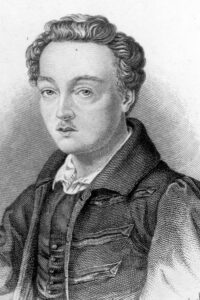
Woyzeck
HAUPTMANN: Es wird mir ganz angst um die Welt, wenn ich an die Ewigkeit denke. Beschäftigung, Woyzeck, Beschäftigung! Ewig: das ist ewig, das ist ewig – das siehst du ein; nur ist es aber wieder nicht ewig, und das ist ein Augenblick, ja ein Augenblick – Woyzeck, es schaudert mich, wenn ich denke, daß sich die Welt in einem Tag herumdreht. Was ‘n Zeitverschwendung! Wo soll das hinaus? Woyzeck, ich kann kein Mühlrad mehr sehen, oder ich werd melancholisch.
WOYZECK: Jawohl, Herr Hauptmann.
HAUPTMANN: Woyzeck, Er sieht immer so verhetzt aus! Ein guter Mensch tut das nicht, ein guter Mensch, der sein gutes Gewissen hat. – Red er doch was Woyzeck! Was ist heut für Wetter?
WOYZECK: Schlimm, Herr Hauptmann, schlimm: Wind!
HAUPTMANN: Ich spür’s schon. ‘s ist so was Geschwindes draußen: so ein Wind macht mir den Effekt wie eine Maus. – [Pfiffig:] Ich glaub’, wir haben so was aus Süd-Nord?
WOYZECK: Jawohl, Herr Hauptmann.
HAUPTMANN: Ha, ha ha! Süd-Nord! Ha, ha, ha! Oh, Er ist dumm, ganz abscheulich dumm! – [Gerührt:] Woyzeck, Er ist ein guter Mensch —aber— [Mit Würde:] Woyzeck, Er hat keine Moral! Moral, das ist, wenn man moralisch ist, versteht Er. Es ist ein gutes Wort. Er hat ein Kind ohne den Segen der Kirche, wie unser hocherwürdiger Herr Garnisionsprediger sagt – ohne den Segen der Kirche, es ist ist nicht von mir.
WOYZECK: Herr Hauptmann, der liebe Gott wird den armen Wurm nicht drum ansehen, ob das Amen drüber gesagt ist, eh er gemacht wurde. Der Herr sprach: Lasset die Kleinen zu mir kommen.
HAUPTMANN: Was sagt Er da? Was ist das für eine kuriose Antwort? Er macht mich ganz konfus mit seiner Antwort. Wenn ich sag’: Er, so mein’ ich Ihn, Ihn –
WOYZECK: Wir arme Leut – Sehn Sie, Herr Hauptmann: Geld, Geld! Wer kein Geld hat – Da setz einmal eines seinesgleichen auf die Moral in der Welt! Man hat auch sein Fleisch und Blut. Unsereins ist doch einmal unselig in der und der andern Welt. Ich glaub’, wenn wir in Himmel kämen, so müßten wir donnern helfen.
Read or download Book
Georg Büchner
Karl Georg Büchner (17 October 1813 – 19 February 1837) was a German dramatist and writer of poetry and prose, considered part of the Young Germany movement. He was also a revolutionary and the brother of physician and philosopher Ludwig Büchner. His literary achievements, though few, are generally held in great esteem in Germany and it is widely believed that had it not been for his early death, he might have joined such central German literary figures as Johann Wolfgang von Goethe and Friedrich Schiller as the summit of their profession.
Life and career
Born in Goddelau (now part of Riedstadt) in the Grand Duchy of Hesse as the son of a physician, Büchner attended the Darmstadt gymnasium, a humanistic secondary school.
In 1828, he became interested in politics and joined a circle of William Shakespeare aficionados, which later on probably became the Giessen and Darmstadt section of the Society for Human Rights (Gesellschaft für Menschenrechte).
In 1831, at age 18, he began to study medicine in Strasbourg. In Strasbourg, he immersed himself in French literature and political thought. He was influenced by the utopian communist theories of François-Noël Babeuf and Claude Henri de Saint-Simon. In 1833 he moved to Giessen and continued his studies at the local university.
While Büchner continued his studies in Giessen, he established a secret society dedicated to the revolutionary cause. In July 1834, with the help of evangelical theologian Friedrich Ludwig Weidig, he published the leaflet Der Hessische Landbote, a revolutionary pamphlet critical of social injustice in the Grand Duchy of Hesse. The authorities charged them with treason and issued a warrant for their arrest. Weidig was arrested, tortured, and later died in prison in Darmstadt; Büchner managed to flee across the border to Strasbourg where he wrote most of his literary work and translated two French plays by Victor Hugo, Lucrèce Borgia and Marie Tudor. Two years later, his medical dissertation, “Mémoire sur le Système Nerveux du Barbeaux (Cyprinus barbus L.)” was published in Paris and Strasbourg. In October 1836, after receiving his M.D. and being appointed by the University of Zürich as a lecturer in anatomy, Büchner relocated to Zürich where he spent his final months writing and teaching until his death from typhus at the age of twenty-three.
Gravestone of Georg Büchner on Germaniahügel in Zürich-Oberstrass
His first play, Dantons Tod (Danton’s Death), about the French Revolution, was published in 1835, followed by Lenz (first partly published in Karl Gutzkow’s and Wienberg’s Deutsche Revue, which was quickly banned). Lenz is a novella based on the life of the Sturm und Drang poet Jakob Michael Reinhold Lenz. In 1836 his second play, Leonce and Lena, satirized the nobility. His unfinished and most famous play, Woyzeck, exists only in fragments and was published posthumously.






